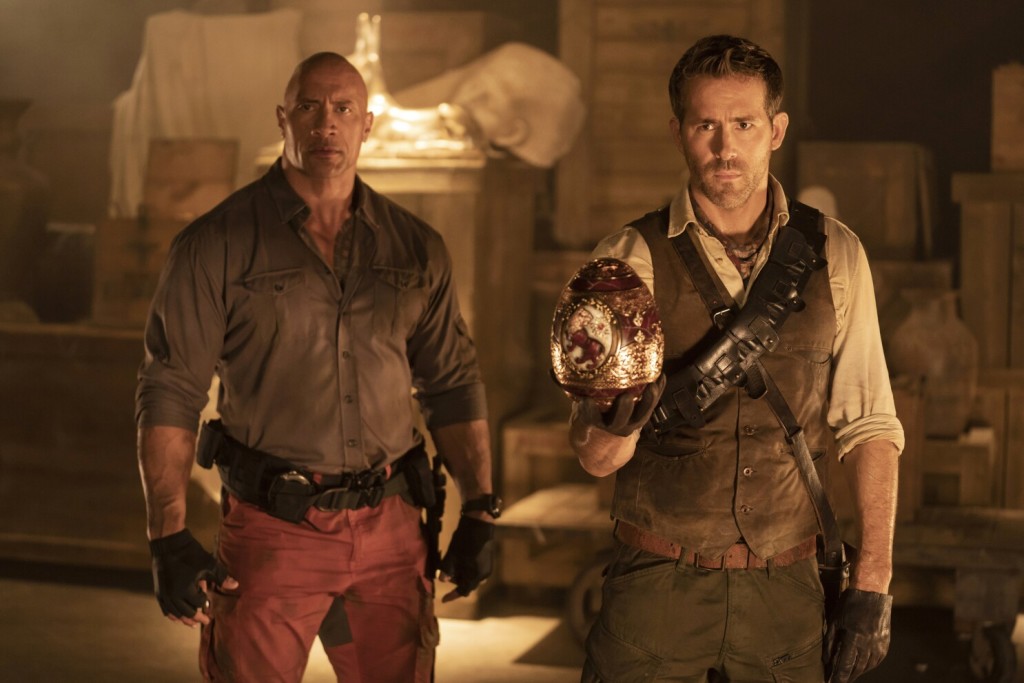This weekend I watched two movies, Shang-Chi and Red Notice. Although I don’t live and die by Rotten Tomatoes scores, I did check the two RT scores for these movies and saw that, for Red Notice, it got a 40%, and Shang-Chi a 92%. I’m going to use today’s post to make an argument why those scores should be reversed. The problem with Red Notice, in my opinion, is that people (critics, in particular) didn’t realize what it was trying to do.
First, it’s giving you an alternative to big fun superhero movies. The superheroes in Red Notice are the outsized personalities of its three leads. Everybody is funny, everybody is charming, and everybody, of course, has a ten gigawatt smile. Second, everybody involved in this movie wanted only one thing: to make audiences feel good. We’re living in a tough day-to-day environment with a lot of polarization and a lot of anger. These guys said, “Let’s make everyone forget about that for two hours.” And, for the most part, they succeeded.
The film, which I’d pitch as Rush Hour meets The Da Vinci Code meets Raiders of the Lost Ark, follows FBI agent John Hartley (The Rock) as he tries to capture the most notorious art thief in the world, Nolan Booth (Ryan Reynolds), who is attempting to steal three bejeweled eggs that belonged to Cleopatra, the entire set being worth 300 million dollars. As the story unfolds, Hartley and Booth must work together to stop a third thief, The Bishop (Gal Gadot) from obtaining those three eggs.
Red Notice got me thinking about a Hollywood movie mainstay: The “Turn Your Brain Off and Just Enjoy Yourself” movie. A lot of cinephiles haaaaaaaaaayte this type of movie. They want their Moonlights. They want their Spotlights. Anything that doesn’t challenge the mind is a waste of their time. But you have to remember that the large majority of moviegoers don’t watch those movies. They just want to be entertained. Which Red Notice does.
Now all “Turn Your Brain Off and Just Enjoy Yourself” movies are not created equal. There are good versions and there are bad versions.
Good Version: Jumanji: Welcome to the Jungle
Bad Version: Geostorm
Good Version: John Wick
Bad Version: 6 Underground
Good Version: Shazam!
Bad Version: The Do-Over
The question is, what is the difference between the two? If you’re setting out to write one of these movies, how do you make sure you write John Wick and not 6 Underground? And I think I know the answer. Laziness. The bad versions of these movies always seem to have more cliches in them. Always seem to have less thoughtful plot beats in them. They seem to be less creative in all the key areas. For example, the whole Continental Hotel thing in John Wick really helped set that movie apart because it built a bigger mythology into the assassin world than your garden variety spy flick.
To put it more succinctly, the bad versions of these films feel like they never got past a second draft. For those of you new to screenwriting, the second draft of a screenplay is where you’re still figuring out how your story comes together. You’re using the second draft, mostly, to fix all the sloppy stuff in the first draft. Then, once you’ve painted a lot of that dry wall, you can start to decorate the interior. But you’re probably not going to finish those decorations until the sixth draft. There’s a whole lot left to figure out in the story.
(Random Star Wars reference ahead) This is why The Phantom Menace was such an oblong clunky experience with little good and a whole lot more bad. It’s because George Lucas famously only wrote one draft. Screenwriting doesn’t favor the lazy. It is a craft that rewards writers who challenge every scene and plot beat and character they’ve written and ask themselves, “Can I make this better in the next draft? And then the draft after that. And then the draft after that.”
Red Notice isn’t a perfect movie but it’s perfect at what it’s trying to do – which is give you 2 hours of pure entertainment. Get to the stuff at the end when World War 2 comes into play and tell me you don’t become giddy. It was like a comedic version of Raiders of the Lost Ark. I had a blast watching this and unless your heart is made of rock, I expect you to like it as well. It kind of has that old-school “line up around the block early 2000s Hollywood” vibe that’s been missing from the industry for a while.
Meanwhile, I checked out Shang-Chi because it was free on Disney +, and I can’t say I felt the same way about it. It started off strong. I loved that out-of-control bus scene inspired by Spider-Man 2. I was digging the main character, Shaun. He played the underdog role well and he was funnier than I thought he would be.
But the whole movie went to Garbage Town as soon as they traveled to the sacred forest. All of a sudden there were dragons and random big dog monsters and about 60 scenes in a row of people sitting around, talking in rooms about their daddy issues. It went from this really cool movie to the world’s most boring superhero flick (not including The Eternals, of course). They even brought back one of the most disliked characters in the Marvel Universe, that dumb Mandarin guy from Iron Man 3.
But the biggest problem with the film was that Marvel, once again, displayed its achilles heel, giving us a 200 million dollar CGI ending it paid 20 million dollars for. You had dumb dragons flying around, as well weird mini-dragons. And people trying to break into some giant cave door. It was so dumb and pointless. This same CGI overload was a problem in Black Widow and Black Panther. The difference is that those movies were good enough to withstand those endings, whereas Shang-Chi was not. They should’ve kept this movie back in San Francisco. That’s where it was working. A huge Marvel letdown.
On the TV side of things, I checked out two shows. The first was the Will Ferrell Paul Rudd Apple show, The Shrink Next Door. You know how when you start watching something and you can tell immediately that it’s not going to work? There’s either a shot or a scene or a character that lands with a big thud? Something about what you’re watching feels disjointed, uncalibrated, off.
That was this show.
We start off with this pointless behind-Will-Ferrell walking scene where he’s in a beekeeper suit and I immediately knew. “Here we go! Quirky for quirk’s sake opening!” And then we cut to Paul Rudd at a party playing this over-the-top persona he clearly isn’t right for. I knew right then that whatever they were attempting to do with this show wasn’t going to work. I kept watching but every subsequent scene only confirmed what those first couple of scenes told us – that this was going to be Lame City. It’s too bad because I really like both actors. But this show is not worth your time.
Which leads me to a show that IS worth your time if you love interesting screenwriting stuff – the show “You” on Netflix. “You” is about a more charming version of Christian Bale’s American Psycho character, a New York bookstore owner named Joe Goldberg. Joe falls in love with a girl who comes into his store, Beck, and starts stalking her, learning everything about her, and then strategically placing himself in situations where they’ll meet so as to, ultimately, become her boyfriend.
The reason this show makes me all slobbery for screenwriting is because it tackles two huge screenwriting pillars. The first is dramatic irony. If you don’t remember what dramatic irony is, it’s one of the most powerful storytelling tools a writer has in his toolbox and basically gives the reader more information than one of the main characters.
“You” is the most aggressive use of dramatic irony I’ve ever seen. I’m going to spoil a few things here, but nothing past the third episode. Joe clones Beck’s phone so that he has access to all her texts, all her social media, all her e-mail, all her calls. He knows everything about Beck as soon as she knows it. Joe is also a killer. He kills Beck’s hookup buddy so as to clear a path to become her boyfriend. And when her best friend starts getting in the way as well, he looks for ways to eliminate her too.
This creates one of the more interesting relationship shows you’ve ever watched because when Joe and Beck are together, we know that there’s this entire other world going on beneath the surface that’s paved the way for this relationship to happen. It makes every single one of their conversations exciting because there’s always an element of subtext involved (that’s a dramatic irony bonus – it automatically creates conversation subtext).
If you’ve ever underestimated what dramatic irony can do for you, check this show out. Because it’s dramatic irony on nitroglycerin. There is never a moment where there isn’t more going on in a scene than just a conversation. There are always several layers UNDERNEATH.
The other crazy thing about this show is it demonstrates just how far you can push a character and still make him sympathetic. Despite everything I just wrote, you will root for Joe and Beck to be together. How is it that a writer can make you root for a character who does such despicable things? Well, watch the show. Because it shows that, with several clever writing tricks, you can make almost anybody sympathetic.
In this case, the guy that Beck was hooking up with was the world’s biggest jerk. He was mean to her. Didn’t care about her. Said a lot of nasty things to her. Only called at 2 am when he was drunk. So when Joe kills him, we’re actually happy. We like Beck a lot and we didn’t want her to be with this guy. And then, with her friends, they’re bad as well. One of them, in particular is super-controlling and manipulative and uses Beck and also keeps her from chasing her dream. So we want Joe to get rid of her.
Another thing that really helps when you have a bad person is voice over. “You” has more Joe voice over than it does regular dialogue. Joe is always taking us through his thought process. Sometimes it’s creepy. But mostly, it’s motivated by good intentions. The more we hear someone talk about why they’re doing things, the more likely we are to understand them. Whereas, if there was no Joe voice over and we saw him kill people, we’d probably hate him.
And they do cheap ‘save the cat’ things as well. There’s a kid who lives in the apartment next to Joe whose step-dad is abusive and Joe helps the kid cope, always giving him books from his store and giving him a shoulder to cry on. It’s audience manipulation at its finest but, hey, it works. Who isn’t going to like a character who helps a kid living with an abusive family?
So from a screenwriting perspective, this show is worth checking out because it does things you’re not supposed to do and has figured out a way to make them work – mainly that the protagonist is a stalker-slash-serial killer and we still want him to end up with the girl. I haven’t run into too many movies or shows that have been able to pull something like that off. Which is why I’m so impressed. Check it out if you can!



